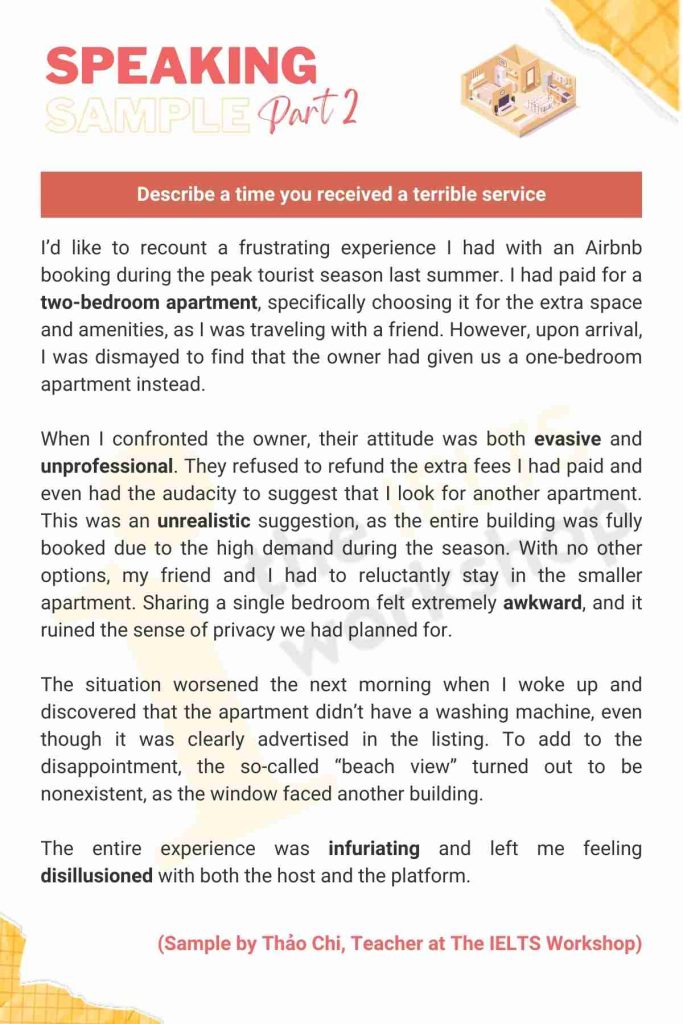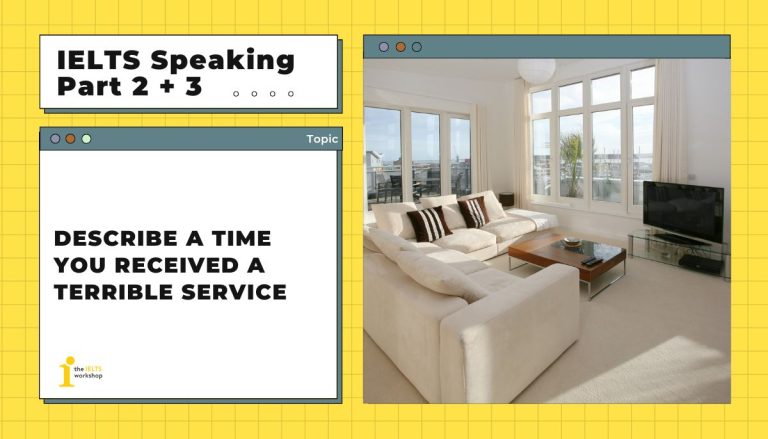Trong chuyên mục giải đề IELTS Speaking kỳ này, cùng tham khảo bài mẫu của cô Thảo Chi từ The IELTS Workshop với chủ đề: “Describe a time you received a terrible service”. Cùng tham khảo tự vựng và các cấu trúc ghi điểm nhé.
Part 2: Describe a time you received a terrible service
Describe a time you received a terrible service
You should say:
When it was
Where you went to
How poor the service was
And say how you felt about that service
Dưới đây là bài mẫu cho topic “Describe a time you received a terrible service”.
1. Bài mẫu (Sample)

2. Từ vựng (Vocabulary)
- Two-bedroom apartment – Căn hộ hai phòng ngủ.
- Evasive – Né tránh.
- Unprofessional – Thiếu chuyên nghiệp.
- Unrealistic – Phi thực tế.
- Awkward – Ngượng ngùng.
- Infuriating – Gây tức giận.
- Disillusioned – Thất vọng bởi thứ mà mình tin tưởng.
Part 3
Bên cạnh Part 2, bạn hãy tham khảo thêm Part 3 cho chủ đề này nhé
Under what circumstances do people typically receive poor service?
Do you find complaining in person or complaining via email more effective?
Why are some people always dissatisfied with all the services provided by restaurants or stores?
Why are some people unhappy when using the service?
What are the reasons why customers are dissatisfied when using the service?
Why do some people still choose to remain silent despite experiencing poor service?
1. Under what circumstances do people typically receive poor service?
People typically receive poor service in situations where businesses are understaffed, poorly managed, or lack proper training for their staff. For example, during peak hours, restaurants or customer service centers may struggle to handle high demand, leading to delays and subpar experiences. Additionally, when companies prioritize profit over quality, they may cut corners, resulting in inadequate service.
- Subpar – Dưới mức kì vọng bình thường.
- Cut corners – Làm qua loa.
2. Do you find complaining in person or complaining via email more effective?
I believe complaining in person tends to be more effective because it allows for immediate feedback and a direct conversation with the service provider. This method often results in a quicker resolution and a better understanding of the customer’s concerns. On the other hand, complaining via email can take longer to receive a response, and the lack of face-to-face interaction might result in miscommunication or less empathy from the service provider.
- Immediate feedback – Phản hồi ngay lập tức.
- Miscommunication – Hiểu nhầm.
3. Why are some people always dissatisfied with all the services provided by restaurants or stores?
Some people are always dissatisfied because they have unrealistic expectations or a negative mindset toward service in general. They may expect perfection in every interaction, ignoring minor issues that are part of normal customer experiences. Additionally, people with a tendency toward perfectionism may focus excessively on flaws, leading to constant dissatisfaction.
- Unrealistic expectations – Kỳ vọng phi thực tế.
- Negative mindset – Tư duy tiêu cực.
- Perfectionism – Chủ nghĩa hoàn hảo.
4. Why are some people unhappy when using the service?
Some people become unhappy because of factors like poor communication, long waiting times, or a lack of attention to detail. If their needs are not properly understood or met, they may feel overlooked or neglected. Additionally, inconsistency in service quality can create frustration when expectations are not consistently fulfilled.
- Poor communication – Giao tiếp kém.
- Long waiting times – Thời gian chờ lâu.
- Attention to detail – Chú ý đến từng chi tiết.
5. Why do some people still choose to remain silent despite experiencing poor service?
Some people choose to remain silent because they feel that complaining will not lead to any meaningful resolution. They may worry about conflict or fear negative consequences, such as being treated poorly in the future. Others prefer to avoid confrontation altogether, especially in situations where they believe their voice might not be heard.
- Meaningful resolution – Giải pháp có ý nghĩa.
- Negative consequences – Hậu quả tiêu cực.
Bài mẫu bởi cô Thảo Chi – Giáo viên The IELTS Workshop
Xem thêm: Describe a bad service you received in a restaurant/shop | IELTS Speaking Part 2 + 3
Trên đây là bài mẫu cho topic: Describe a time you received a terrible service. Các bạn có thể tham khảo Bộ đề dự đoán IELTS Speaking 2025 quý 1của The IELTS Workshop tại đây!
Ngoài ra, khoá học Senior của The IELTS Workshop sẽ giúp bạn nâng cao kỹ năng cũng như xây dựng chiến lược trả lời câu hỏi, tham khảo ngay nhé!!









